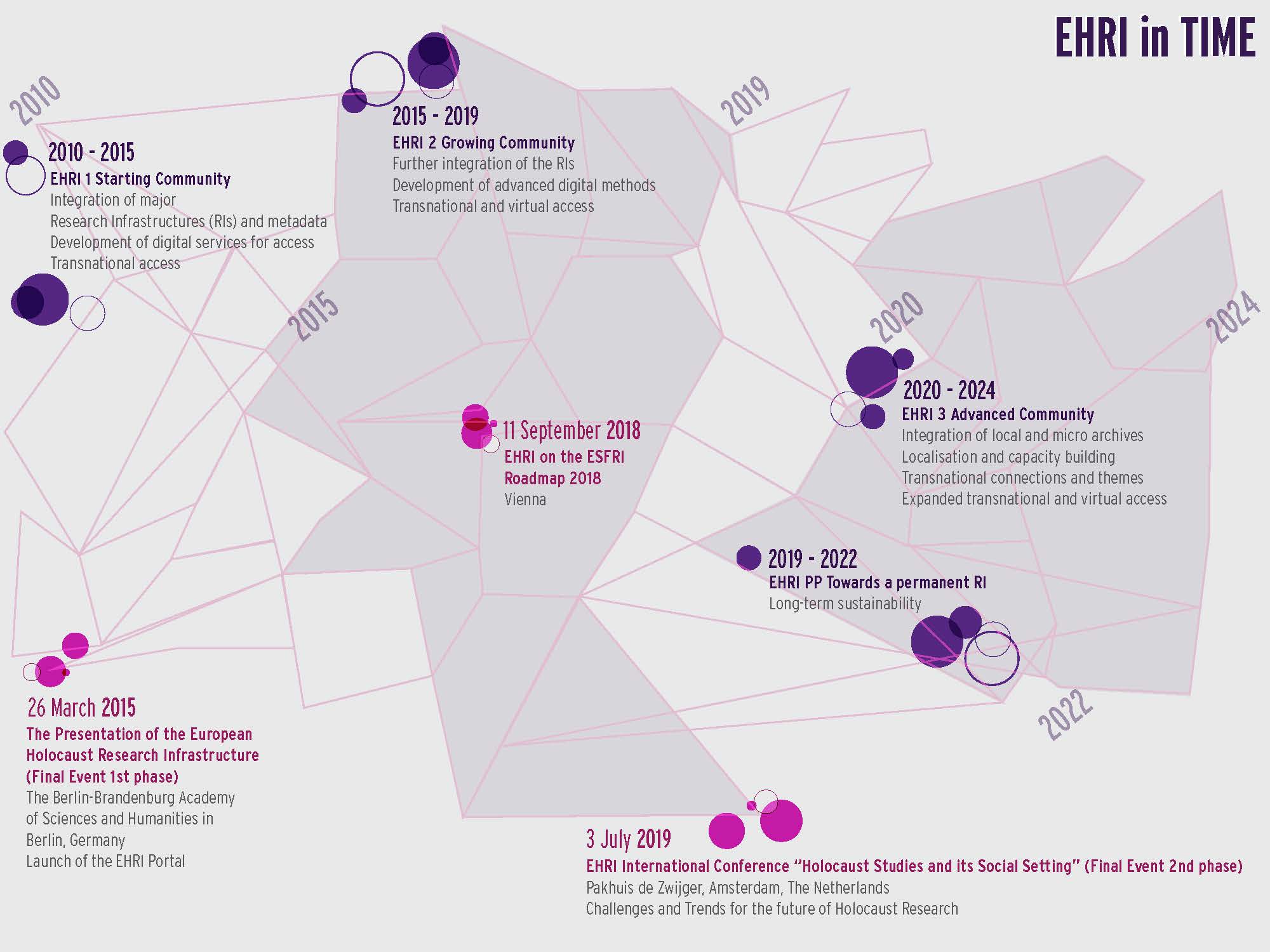EHRI Projects Overview
The European Holocaust Research Infrastructure (EHRI) has transformed from a series of projects into an international permanent organisation EHRI-ERIC (European Research Infrastructure Consortium). EHRI-ERIC was inaugurated on 26 January 2025 during a ceremony in Warsaw, Poland.
Currently, there is still one project running, EHRI-IP (Implementation Phase), which is dedicated to undertaking all the necessary legal, financial and strategic work to have EHRI-ERIC fully operational by the end of the implementation phase in 2026.
What started out as a project of four years in 2010, has now matured into a permanent, independent European infrastructure for Holocaust research.
All EHRI projects were coordinated by NIOD Institute for War, Holocaust and Genocide Studies, Amsterdam.
EHRI-ERIC was built upon the achievements of its projects:

Main aim:
The vision of the European Holocaust Research Infrastructure (EHRI) is to secure seamless access to all sources and expertise from across Europe and beyond that are relevant to the study of the Holocaust. It approaches this vision through the development of a pan-European distributed Research Infrastructure that brings together the leading facilities and offers users integrated access to Holocaust resources, expertise and training. In 2018, EHRI was added to the ESFRI Roadmap, and is currently finalising a step-1 application to establish a new European Research Infrastructure Consortium (ERIC), supported by eleven countries. The EHRI-IP project will facilitate EHRI’s implementation phase and ensure a timely start of its operation as an ERIC. Read the project summary
Time scheme: February 2024 – January 2026, 24 months
Funding scheme: Horizon Europe
Funding amount: € 1.5 mio
Consortium: 14 partners from 13 countries
Main aim:
The EHRI-3 project deepens the integration of Holocaust archives and research that has been undertaken by EHRI since 2010. The project will lead to a substantial increase in the coverage of the EHRI Online Portal, particularly with regards to the holding of very small micro-archives; the development of new digital tools that connect dispersed Holocaust sources; the delivery of state-of-the-art training and education opportunities for researchers and archivists; the continuation and enhancement of the Conny Kristel Fellowship Programme. Read the project abstract.
Time scheme: September 2020 – 1 March 2025, 54 months
Funding scheme: Horizon 2020
Funding amount: € 6 mio
Consortium: 26 partners from 17 countries
The EHRI Preparatory Phase project (EHRI-PP)
Main aim:
EHRI-PP will secure the long-term future of trans-national Holocaust research. It will undertake all the necessary legal, financial and strategic work to launch EHRI as a permanent distributed European Research Infrastructure that provides stable, long-term services to the Holocaust research community by 2025. Read the project abstract.
Time scheme: December 2019 – November 2022, 36 months
Funding scheme: Horizon 2020
Funding amount: € 4 mio
Consortium: 15 partners from 13 countries
Main aim:
The aim of the second phase is to sustain and further expand the existing community and activities. Building on the achievement of the EHRI-1 project, EHRI-2 focuses on ‘hidden’ archives that are not part of larger infrastructures. It establishes links with institutions in those parts of Europe that have traditionally been under-represented in international research, especially in Eastern and Southern Europe. EHRI also facilitates the digital transformation of Holocaust research by developing new digital methods, and by providing the next generation of researchers and archivists with the skills they need to succeed in the digital age. Read the project summary.
Time scheme: May 2015 – October 2019, 54 months
Funding scheme: Horizon 2020
Funding amount: € 8 mio
Consortium: 24 partners from 17 countries
Main aim:
EHRI’s main objective is to support the European Holocaust research community and help initiate new levels of collaborative research through the development of innovative methodologies, research guides and user-driven transnational access to research infrastructures and services. To this end, EHRI designs and implements a Virtual Research Environment offering online access to a wide variety of disparate and dispersed key Holocaust archival materials and to a number of online tools to work with them. Read the project summary.
Time scheme: October 2010 – March 2015, 54 months
Funding scheme: 7th Framework Programme (FP7)
Funding amount: € 7 mio
Consortium: 19 partners from 13 countries
